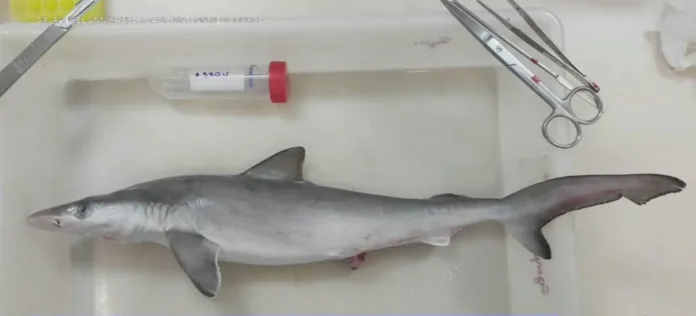Study finds Brazilian sharp nose sharks with high cocaine levels, highlighting the environmental impact of drug trafficking on marine life.
In a startling discovery, scientists have found significant levels of cocaine in Brazilian sharp-nosed sharks off the coast of Brazil. This marks the first known instance of cocaine being detected in free-ranging sharks, shedding light on the broader environmental implications of drug pollution in ocean waters.
The study, conducted by researchers from the Oswaldo Cruz Foundation, involved dissecting 13 wild Brazilian sharp-nosed sharks, a species that inhabits coastal waters and is particularly vulnerable to pollutants. The sharks were obtained from small fishing vessels, ensuring that they were exposed to typical coastal conditions. Researchers utilized a sophisticated analytical technique known as liquid chromatography with tandem mass spectrometry. This method allowed them to separate and identify molecules present in the sharks’ muscle and liver tissues, specifically searching for cocaine and benzoylecgonine, a primary metabolite of the drug.
All 13 sharks tested positive for cocaine, with concentrations reaching up to 100 times higher than those previously reported in other marine species. This unprecedented finding underscores the pervasive nature of drug pollution and raises concerns about its impact on marine ecosystems. Interestingly, the study revealed that the cocaine concentrations were more prevalent in the muscle tissue of the sharks than in their livers, though the reasons for this distribution remain unclear.
While this discovery is groundbreaking, the researchers caution that the field of study is still in its infancy. The full impact of cocaine and its metabolites on aquatic life remains poorly understood, necessitating further research to assess the ecological consequences.
This revelation comes amidst ongoing concerns about the environmental fallout from drug trafficking. The dumping of drugs, particularly in regions like Florida and South and Central America, has been suspected of affecting marine life, but this study provides concrete evidence for the first time. The findings were published in the journal Science of the Total Environment.
The broader implications of such pollution are significant, raising questions about the long-term health of marine ecosystems and the potential bioaccumulation of toxic substances in the food chain. As drug trafficking continues to be a major issue, with the US Coast Guard seizing over 14,100 pounds of cocaine worth an estimated $186 million in June last year, the environmental dimension of this illegal trade is gaining increasing attention.
Analysis:
Political: The discovery of cocaine in sharks highlights the often-overlooked environmental impact of drug trafficking. This issue necessitates stronger international collaboration and policy-making to address both the illegal drug trade and its environmental consequences. Governments may need to implement stricter regulations and increase funding for environmental protection agencies to monitor and mitigate the effects of pollution on marine life.
Social: Socially, this study could raise awareness about the indirect effects of illicit drug activities on the environment. It underscores the interconnectedness of human actions and natural ecosystems, potentially leading to greater public support for environmental conservation efforts. Educational campaigns might focus on how drug use and trafficking contribute to broader ecological issues, influencing public behaviour and policy support.
Racial: The issue of drug pollution in marine ecosystems can also intersect with broader racial and socioeconomic dynamics. Coastal communities, often marginalized and economically disadvantaged, may rely on fishing and tourism, both of which could be impacted by declining marine health. These communities may bear the brunt of both environmental degradation and economic losses, highlighting the need for inclusive environmental justice policies that consider the needs of all stakeholders.
Gender: The environmental impact of drug trafficking and pollution can also have gender-specific consequences. In many coastal regions, women play key roles in local economies, particularly in fisheries and small-scale businesses. The degradation of marine ecosystems due to pollution can thus disproportionately affect women’s livelihoods, necessitating gender-sensitive approaches to environmental policy and economic support programs.
Economic: Economically, the presence of cocaine in marine life could have significant implications for the fishing and tourism industries. Contaminated marine species may pose health risks to consumers, potentially leading to stricter regulations and loss of market confidence in seafood products. Additionally, the perception of polluted waters can deter tourism, affecting local economies dependent on these sectors. Addressing this issue requires not only environmental remediation efforts but also public health advisories and support for affected industries.
